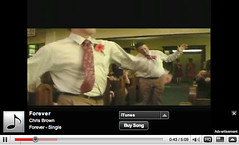
- Image by *0ne* via Flickr
That puts me at odds with many other "true" fans who scoff at my fickle ways. True fans, I'm told, really don't care if their team is winning or losing, but are there to constantly show their support.
Bunk.
At least that should be bunk for anyone trying to succeed today. Leaving sports aside for a moment, I suggest to you that you neither need nor want true fans. Not until you get really, really good at what you do. And even then, be careful. True fans are often times at best misguided and at the worst, lying. Sometimes. Because let's face it -- everything you create/write/build/paint/draw/shoot/make/bake/do isn't perfect. It can't always be OMFGTHISISTHEBESTEVER... which is about all you ever get out of your "true" fans.
Praise children. Be honest with adults.
I wrote about the fine line between false praise and encouragement about this time last year. Perhaps it's the season. And while that still holds true, I didn't go far enough to encourage creators to seek out and cultivate fair-weather fans. Hearing praise and accolades is nice, to be sure. But for how long? And is it really helping you get better at what you do?
While you're out there trying to relentlessly connect with fans -- a great idea -- demand them to be relentless in return. And when the critiques come in, don't shy away. Don't bury yourself in the mounds of praise you received from your "true" fans. Examine the critique. See where it fits. Ask around. Take it under advisement. And when necessary, get better. How else will you know you need to if they don't tell you?
![Reblog this post [with Zemanta]](http://img.zemanta.com/reblog_e.png?x-id=32a58dc0-b2e7-40ef-bc79-82598a23c13f)

![Reblog this post [with Zemanta]](http://img.zemanta.com/reblog_e.png?x-id=fecc5a9a-4649-4e9f-9702-46708462216a)

![Reblog this post [with Zemanta]](http://img.zemanta.com/reblog_e.png?x-id=0cabe0f0-6233-4e92-b6b0-c2f62700443b)

![Reblog this post [with Zemanta]](http://img.zemanta.com/reblog_e.png?x-id=26ec6c75-4259-45e4-9190-d701e713dedb)

![Reblog this post [with Zemanta]](http://img.zemanta.com/reblog_e.png?x-id=b9cc2af7-c655-4a2e-b80e-33fa9003bd22)

![Reblog this post [with Zemanta]](http://img.zemanta.com/reblog_e.png?x-id=4f4a9416-075d-4fb6-8285-7196d5a6ae95)

![Reblog this post [with Zemanta]](http://img.zemanta.com/reblog_e.png?x-id=ddddc654-0424-485e-9b7c-92c6ad9b344d)

![Reblog this post [with Zemanta]](http://img.zemanta.com/reblog_e.png?x-id=a8afe4a7-3179-45b7-aa62-81a749c82cf2)

![Reblog this post [with Zemanta]](http://img.zemanta.com/reblog_e.png?x-id=96b5765d-75a7-4c4c-b31c-4163aeb2ac6f)

![Reblog this post [with Zemanta]](http://img.zemanta.com/reblog_e.png?x-id=c3402420-9f70-498a-969d-b54975e31151)

![Reblog this post [with Zemanta]](http://img.zemanta.com/reblog_e.png?x-id=64962b6e-aadc-4296-a058-e222b27b2f2a)

![Reblog this post [with Zemanta]](http://img.zemanta.com/reblog_e.png?x-id=0860b03e-1594-44a5-8b0a-cebe1e1499cc)

![Reblog this post [with Zemanta]](http://img.zemanta.com/reblog_e.png?x-id=b4a13c1d-d312-4438-bb50-5dd5d902edf6)

![Reblog this post [with Zemanta]](http://img.zemanta.com/reblog_e.png?x-id=0323a216-90cc-408c-bdfd-a0d82df0a6e3)

![Reblog this post [with Zemanta]](http://img.zemanta.com/reblog_e.png?x-id=255a480e-198c-4da6-8003-865ede69fa69)
